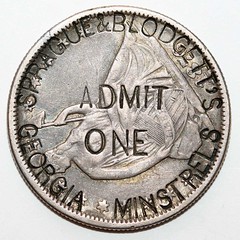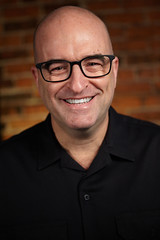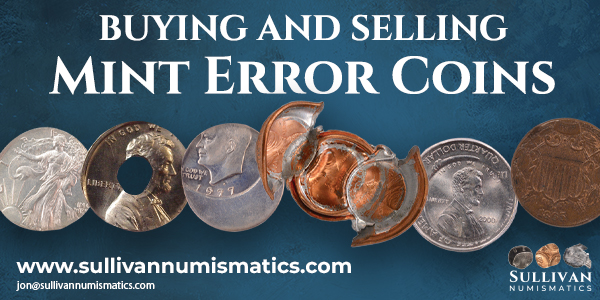
PREV ARTICLE
NEXT ARTICLE
FULL ISSUE
PREV FULL ISSUE
DAVID SCHENKMAN INTERVIEW, PART THREEGreg Bennick's latest interview for the Newman Numismatic Portal is with token expert David Schenkman. Here's the third of six parts, where Dave and Greg discuss counterstamps. -Editor
Greg Bennick: Are the people who are discovering or connecting these counterstamps to
historical sources, are they typically researchers, scholars and academics and coin experts? Or
are they the average person who happens upon, say a token and says,
Greg Bennick: Yeah, that totally makes sense. Okay, so along these lines, we've mentioned them in reference them a few times: counterstamps. I've become fascinated by counterstamps in the last year or so, and I actually purchased two really cool ones from you recently. But I wanted to talk about counterstamps a bit and pose the same question to you as I did just in case somebody didn't listen to the Bill Groom interview. And they're just coming into this for the first time and they don't have a sense of what counterstamps were or are. Could you tell us a little bit about counterstamps and then maybe we'll talk about some specific ones using the examples that I bought from you recently as examples for our conversation.
Greg Bennick: Pretty remarkable. And I know that the two pieces that I bought from you
recently were fascinating because they could be connected directly to historical events and
people from history who have biographical information available online and available out in the
world. So, it's really different. And by different I mean people all the time will say, David Schenkman: You go ahead because you just researched it. And I will say that I just completed an article for The Numismatist, the ANA's publication on numismatics of 19th century entertainers, and that includes counterstamps like that because those were both shows, minstrel shows, circuses that traveled from town to town and performed and hopefully made money. And there are a lot of counterstamps that were issued by these companies and there are a lot of other types of tokens. So the article I just finished, which is too large to run in one issue, so they're going to run it over two issues - I don't know when - but it'll talk about those counterstamps, other counterstamps and a variety of other types of medals and tokens relating to the same topic.
Greg Bennick: So what I found out after I purchased the counterstamp from you was that
Sprague and Blodgett's was a Georgia minstrel show and by Well, what I found fascinating was that if you do a deep dive into Sprague and Blodgett's show, you can actually find the names of performers that are assumed to have performed or known to have performed in the show. And then if you go a step further, some of these folks after the minstrel show was done and after the minstrel shows lost maybe the height of their appeal, they turned to film and other performing avenues. One of them in particular starred in a silent film that I watched the other night. So, I'm sitting there the other night and talk about if a coin could speak. I'm sitting there with the coin in my hand, which in 1876, 1877 would have gained me access to see a performer on stage singing. And as I'm holding that coin in my hand, I'm watching that same man now on screen in a silent film acting. I'm watching the actual man that I would have gained access to see by the coin that I held in my hand. That might have been the coolest numismatic experience I've ever had, and I've had some cool ones. That was pretty remarkable. So thank you for that opportunity. That was pretty amazing.
David Schenkman: Well, that's interesting, Sprague and Blodgett's were two men, Z. W
Sprague and Wash Blodgett, and their partnership only lasted for three years from 1877 to early
1880. And then after they severed the relationship, Sprague continued to tour with his group as
Sprague Georgia Minstrels. And the reason you always find that counterstamp on a half dollar
is because it says
To watch the complete video, see:
To read the complete transcript, see:
To read the earlier E-Sylum articles, see:
Wayne Homren, Editor The Numismatic Bibliomania Society is a non-profit organization promoting numismatic literature. See our web site at coinbooks.org. To submit items for publication in The E-Sylum, write to the Editor at this address: whomren@gmail.com To subscribe go to: https://my.binhost.com/lists/listinfo/esylum All Rights Reserved. NBS Home Page Contact the NBS webmaster 
|



